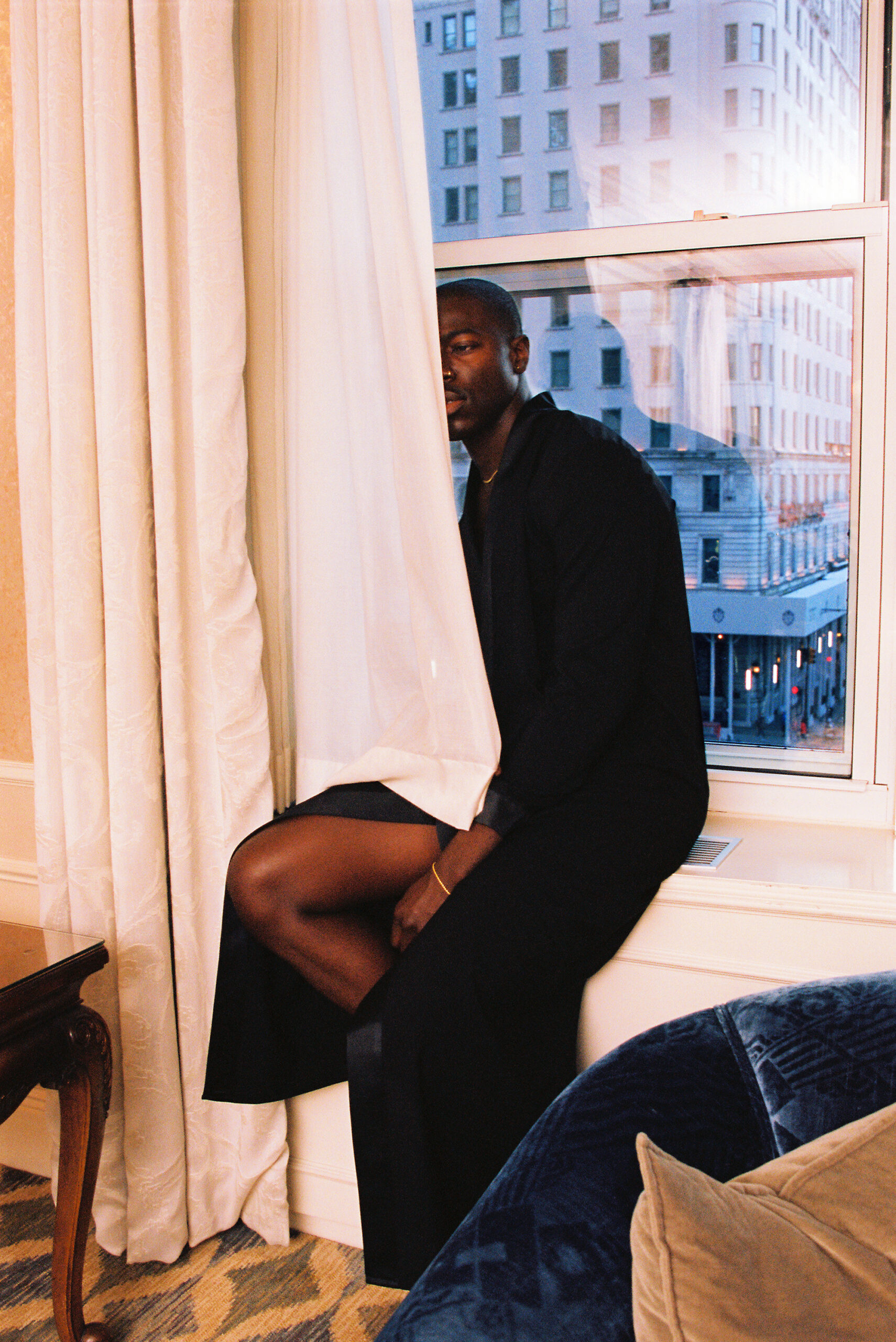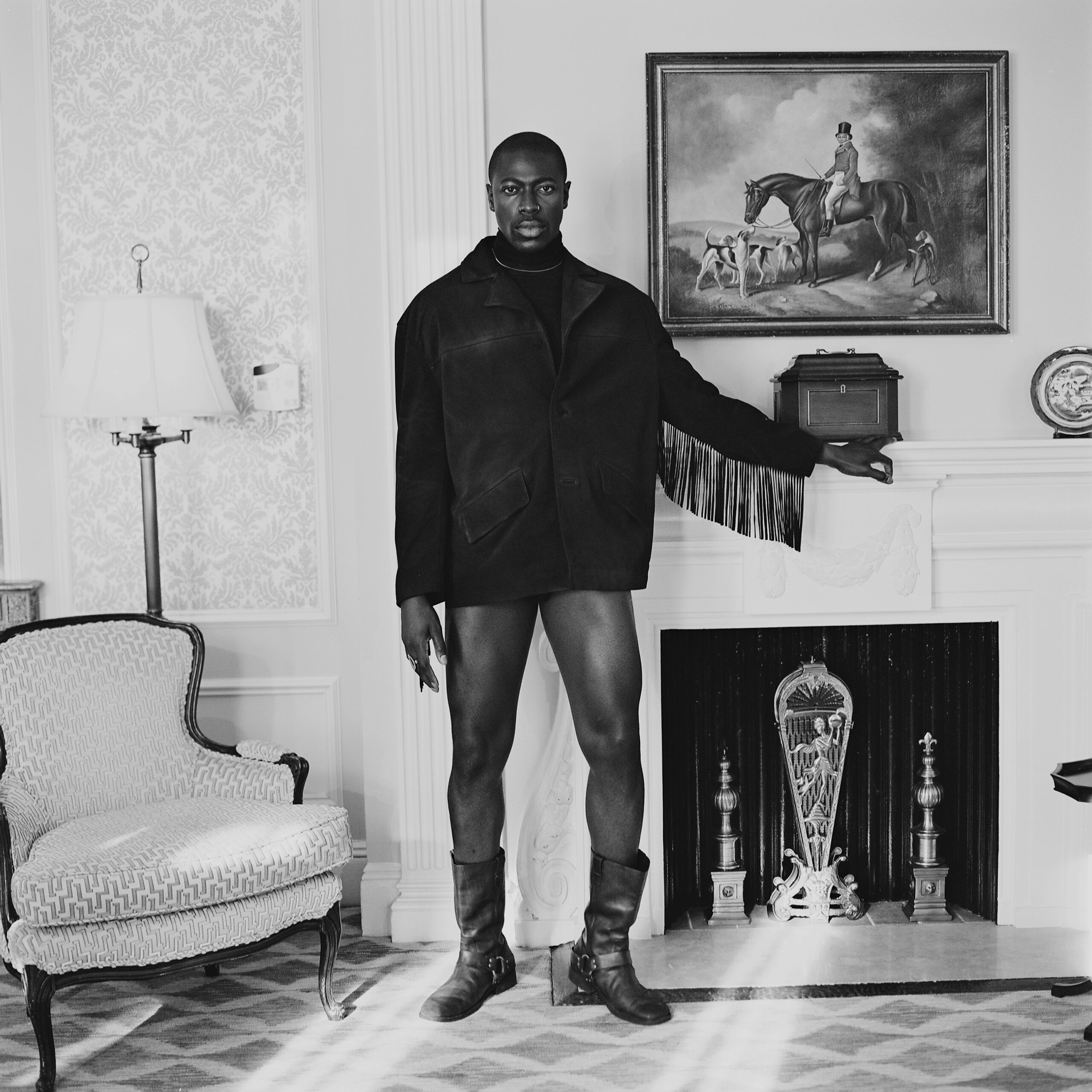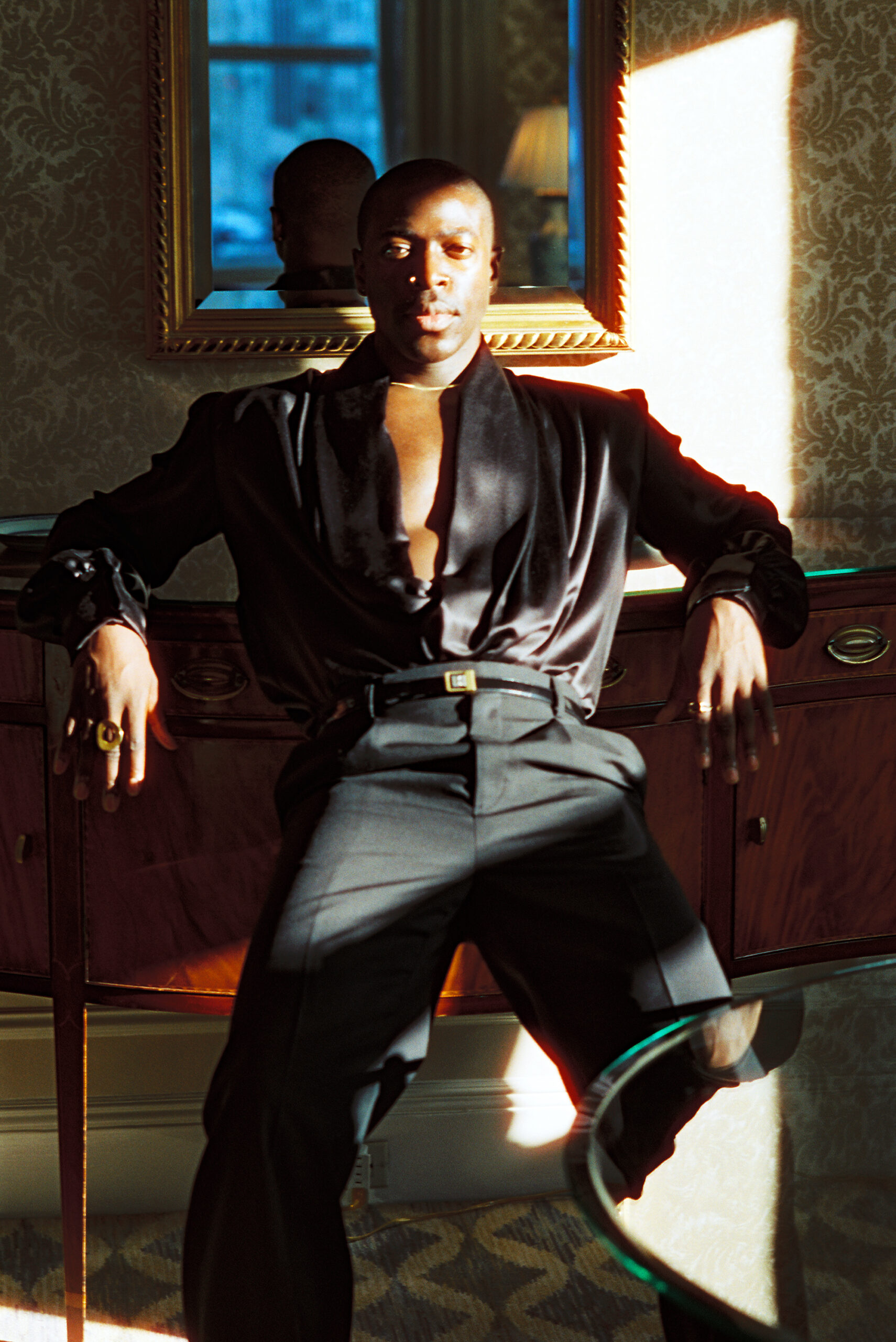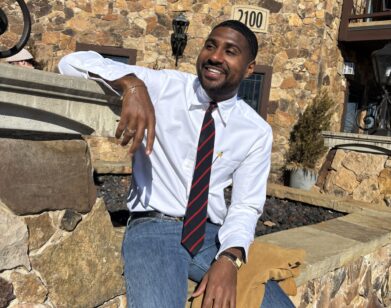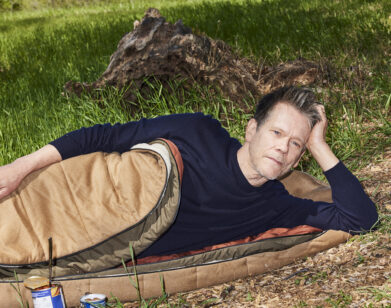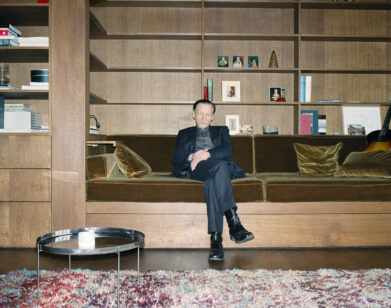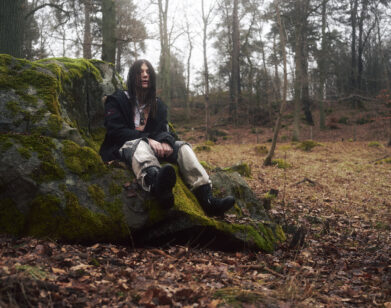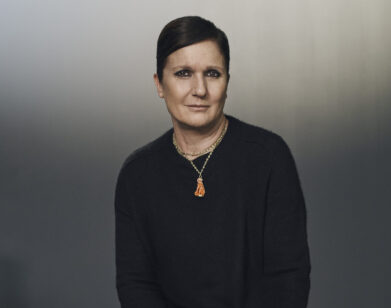SINGER
“This Is Our Duet”: Moses Sumney, in Conversation with Ayo Edebiri
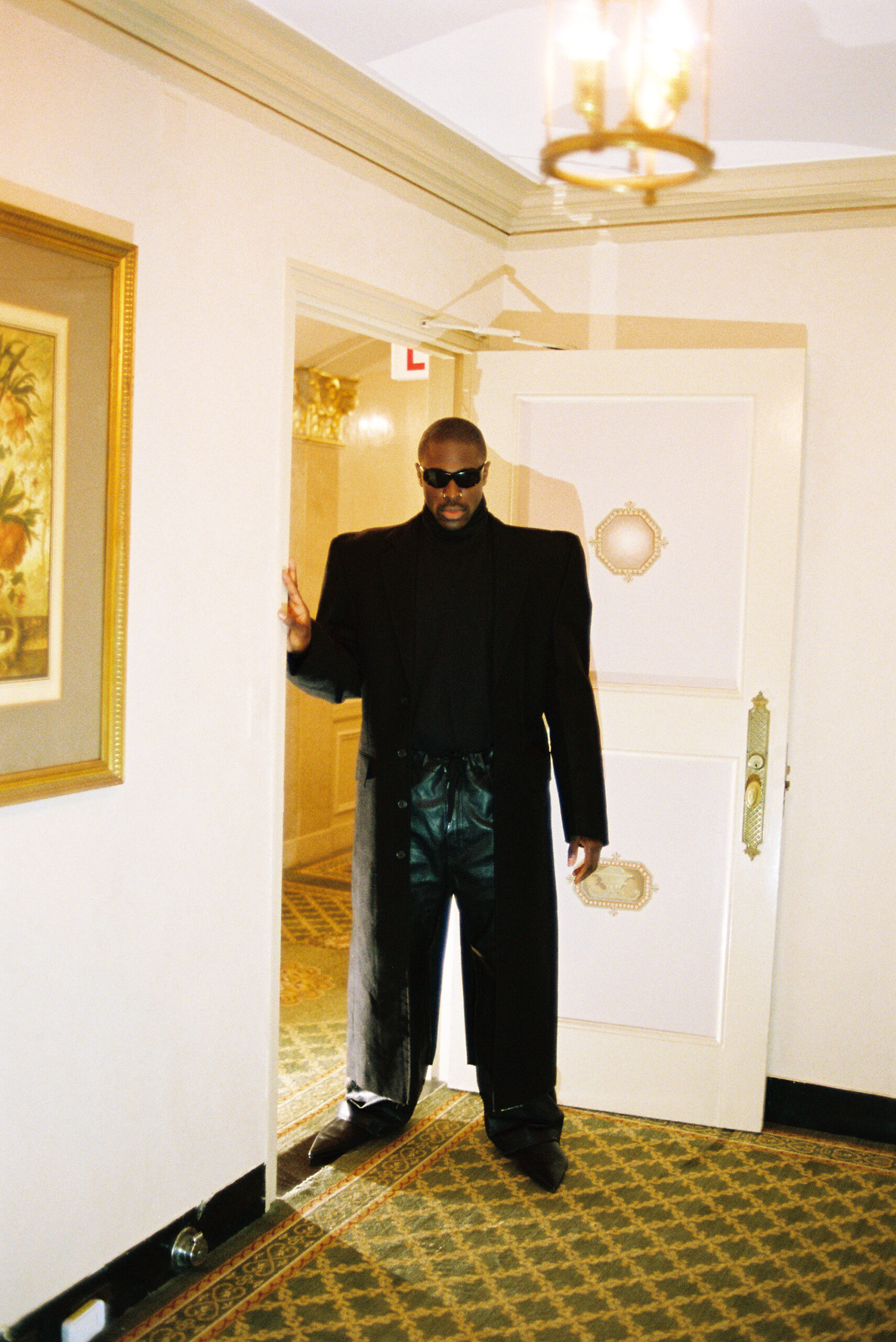
Moses Sumney wears Coat, Top, Pants, and Shoes Balenciaga. Earrings and Nose Rings (worn throughout) Moses’s Own. Sunglasses Oliver Peoples.
“There’s a reason I’m putting out music again,” says Moses Sumney. Since releasing his debut album, Aromanticism, in 2017, the 31-year-old musician has been the sole architect of his creative vision, expressing himself through his sultry falsetto and confessional lyrics. Then, Sumney took his talents to Hollywood, first as a seductive songwriter in HBO’s The Idol, followed by an upcoming mystery role in MaXXXine, the highly anticipated final installment of Ti West’s erotic X trilogy. The experience led him back to the studio. With a new EP on the way, Sumney got on a call with his friend and fan Ayo Edebiri to talk about the Rapture, leaving L.A., and learning to say no.
———
TUESDAY 3 PM FEB. 20, 2024 ASHEVILLE, NC
AYO EDEBIRI: So where are you?
MOSES SUMNEY: I’m in Asheville, North Carolina, in my house.
EDEBIRI: Wait, you live in North Carolina?
SUMNEY: I do. Quiet as it’s kept. It’s actually something you would know if you look me up, but—
EDEBIRI: Okay, relax. [Laughs] Sorry that I’m trying to get to know you.
SUMNEY: It’s a trauma response to literally anyone being interested in me. Sorry. [Laughs]
EDEBIRI: Okay. This is encouraging to me because I want to not live in L.A. or New York.
SUMNEY: Where do you currently live?
EDEBIRI: Where do I pay rent? L.A. But I spend a good chunk of the year in Chicago because that’s where we shoot The Bear. And then I sort of live wherever they tell me to go because that’s what being an actress is.
SUMNEY: Right. Also, I’m so sorry if this seems performative, but I’m cooking breakfast.
EDEBIRI: At 3 p.m.?
SUMNEY: Yeah, I’ve been in meetings all day and I was like, “I’m so hungry now.”
EDEBIRI: What’s on the menu?
SUMNEY: The most basic-bitch thing: spinach, scrambled eggs, and bacon.
EDEBIRI: Live your truth.
SUMNEY: Where are you right now?
EDEBIRI: I’m in Rhode Island. I just flew over from London and I’m here for a few more days, then I go to L.A., then back to Chicago.
SUMNEY: What’s in Rhode Island?
EDEBIRI: A movie that I’m doing a few days on.
SUMNEY: Wait, what movie?
EDEBIRI: A James L. Brooks movie, the director who did Terms of Endearment and The Simpsons Movie and Broadcast News and As Good as It Gets, this sweet, sweet, 83-year-old man.
SUMNEY: Wait, you’re so busy. I really appreciate you doing this. I was surprised when you said yes.
EDEBIRI: No, because I was like, we need to be in a space that’s not, like, a frightening Hollywood party. [Laughs] And I want to see your house. And also they were like, “You can listen to the new EP.” And I was like, “Yeah, obviously.”
SUMNEY: I want you to know, I really did not want to send that. And the only reason you got it was because I didn’t want to fight with my publicist. [Laughs]
EDEBIRI: Want to talk about it?
SUMNEY: We can get there naturally.
EDEBIRI: One could make a case that this is the beginning of getting there. But we can put a pin in it.
SUMNEY: I think I’m just so embarrassed that it exists and also that I’m alive, that we just need to work our way to it.
EDEBIRI: Okay. Love that. We are constantly dealing with the embarrassment of being alive.
SUMNEY: But we’re hanging in there.
EDEBIRI: I think you’re on the winning side.
SUMNEY: You as well. And I have to say, congratulations on everything happening. It’s so crazy and I’m so proud of you. I feel like your African cousin and I’m just, like, “When we were growing up, we always knew one day…” [Laughs] You know when your cousins start claiming you, and you’re like, “You were not there”?
EDEBIRI: Of course. “Actually, you were making fun of me. You’re the source of my trauma.”
SUMNEY: But I actually am so proud of you. Also, I feel like I really know you and I really don’t. And it’s not even from media. I think we’ve had two, maybe three in-person conversations. The first moment I met you, I was like, “I know this person.”
EDEBIRI: I know. There was a moment in one of those slightly scary contexts where I was like, “Why are our eyes saving each other?” [Laughs]
SUMNEY: I think about that all the time. When we ran into each other at this Hollywood party and we both started laughing instantly—we both were like, “We know we have no business being here.” It was both embarrassment but also, like, “Oh, thank god.”
EDEBIRI: Okay, wait, I was talking about my, dare I say, exhaustion as an actor. And you’ve been treading the boards a bit.
SUMNEY: Yes.
EDEBIRI: Have you been enjoying it?
SUMNEY: Umm.
EDEBIRI: [Laughs]
SUMNEY: There’s a reason I’m putting out music again. I love acting. I’m very new to it and I feel so grateful that I could come in and book. It is kind of crazy. Obviously I did a TV show and I have a movie coming out this year, and I feel so grateful that I could be, like, “Oh, I want to act,” and then do it. It wasn’t that easy, but I was determined and it has kind of been working. When I get to act, I love it. But the thing that they don’t tell you is, so much of being an actor is actually not acting at all.
EDEBIRI: Not acting. Nope.
SUMNEY: A lot of it is pretending and a lot of it is self-delusion. I’ve also never been an employee before. I’ve never worked for anyone else and no one has ever told me where to be, when to be, how to be, ever. So that has been a struggle.
EDEBIRI: You’re actually an employee and you’re freelancing. It was different for me. I went to NYU for writing. And I think writing and being in writing rooms in service of other people bought me time. It gave me the confidence to be, like, “Okay, here’s what I can do.”
SUMNEY: It’s completely opposite from my experience.
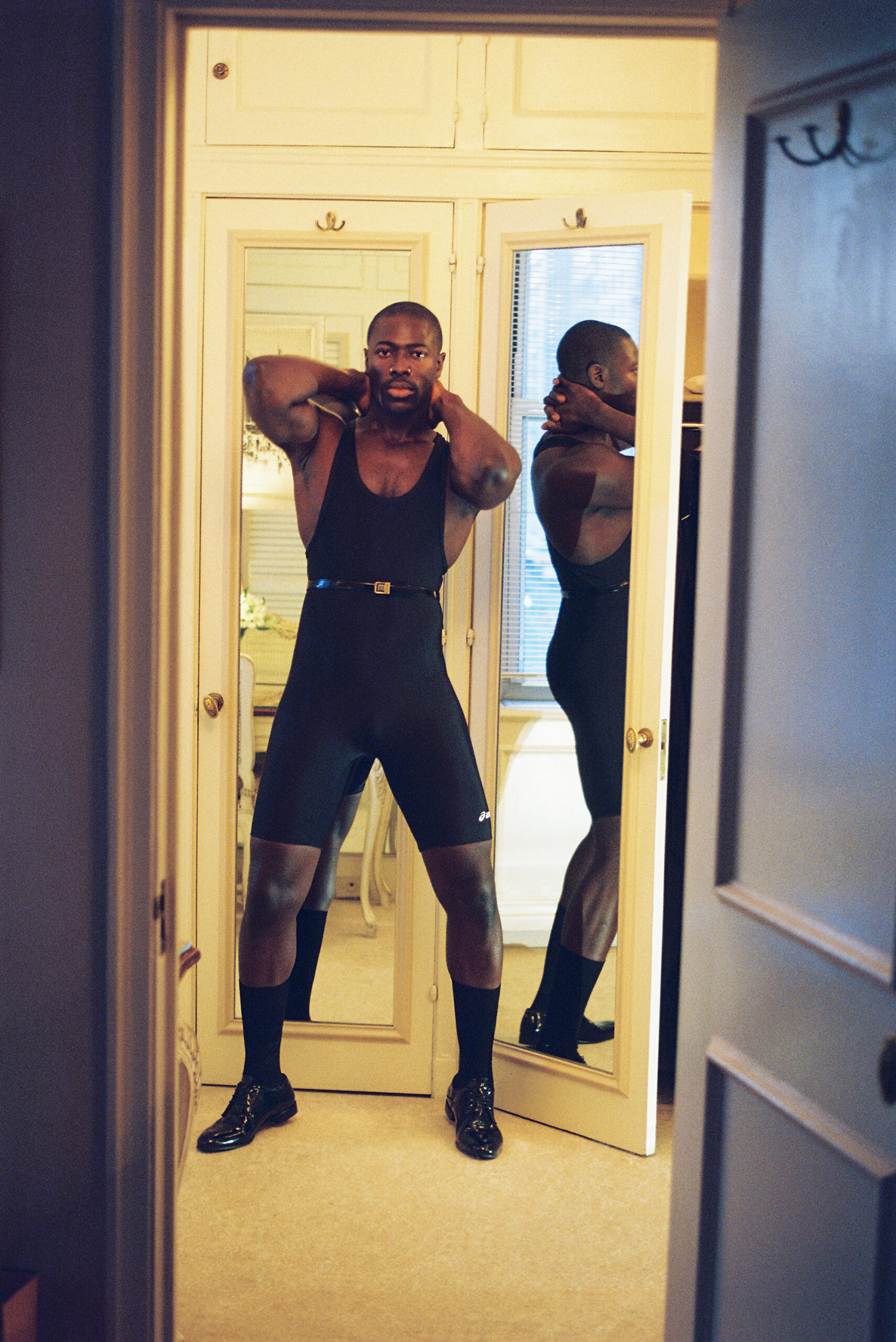
Singlet Stylist’s Own. Belt Saint Laurent by Anthony Vaccarello. Socks Calvin Klein. Shoes Bruno Magli.
EDEBIRI: You studied writing too?
SUMNEY: Yes. I got my degree in creative writing.
EDEBIRI: Were you singing the whole time?
SUMNEY: I always wanted to be a musician. Writing was the thing that I could do on paper, I guess pun intended, but I never studied music. So by the time I got to college, I did not have enough theoretical knowledge to get a degree in music. So I was like, “Well, I’ll get a degree in the thing that I’m good at and then hopefully I can apply that to my music stuff.” But these days I’ve been writing more and more. It’s interesting to hear the thing about confidence because I was so thrown into the deep end as an artist. And then when it came to the film side, I’ve been directing my own music videos. I’ve been present in them in a way that, when I’m on set, my mind is like, “I need to do more.” Also, I haven’t done huge roles, but sometimes I’m sitting there and I’m like, “Don’t you need me to do something else? I have an opinion.” [Laughs]
EDEBIRI: I relate. When I was starting acting, I was like, “Wait, I’m not a vessel. I’m not one of those people you can just put a camera on. I’m here as an actor, but I have a writer’s thoughts. I have a producer’s thoughts. I also want to know what the shot is. I’m not going to be the boss, but it’s helpful for me to know. And when you withhold that information, I feel like a stupid baby and I’m not.”
SUMNEY: I think that speaks to the kinds of minds we have. I’ll go to work on my days off and watch other people because I’m like, “I want to soak it all in. I need something to do.”
EDEBIRI: A lot of acting is sitting and waiting.
SUMNEY: They didn’t tell me about the waiting.
EDEBIRI: Because if they tell you, you won’t do it.
SUMNEY: [Laughs] But this is also why I say some of the best actors that I know personally are really dumb people. Sorry, let me rephrase. They’re mentally available.
EDEBIRI: Simple.
SUMNEY: Interchangeable, honestly. They’re safe. And sometimes I wonder if my thoughts may keep me from being a good actor. How’s it for you as a funny person? Because I do feel the more intelligent you are, the more sad life is.
EDEBIRI: Of course.
SUMNEY: How do you turn that into humor?
EDEBIRI: I’m not sure because I also have memories of being a very depressed child. I was like, “Life is a poem.” I’m Emily Dickinson. I’m Phillis Wheatley. I’m the first Black woman to ever write a poem, and I see that sorrow. And then people would be like, “Oh, you were always such a funny little kid.” And I was like, “Was I, or—”
SUMNEY: “Were you just laughing at me?”
EDEBIRI: Yeah. But I remember in eighth grade being like, “I think I have to be funny. I have to make a choice because I can feel the Sliding Doors moment about to happen, and I want to be able to at least pretend to cope.”
SUMNEY: Sorry, what is the Sliding Doors moment?
EDEBIRI: You know that movie Sliding Doors with Gwyneth Paltrow, where it’s like, if she gets on the train then her life is one way, and if she doesn’t, the doors close and it’s another—
SUMNEY: I’m either going to kill myself or be a comedian.
EDEBIRI: And we’re still alive.
SUMNEY: A path was chosen.
EDEBIRI: So wait, you grew up going to church?
SUMNEY: Yes. My parents are pastors.
EDEBIRI: I’m hearing lyrics, I’m hearing congregation.
SUMNEY: It certainly gives Pentecostal, Baptist, all of those things.
EDEBIRI: Were you Pentecostal?
SUMNEY: My family ran a nondenominational church and there was an element of the Pentecostal Church or the Baptist Church. But it’s all about exuberant phrases and singing and crying and screaming and being Raptured. It was drama, basically.
EDEBIRI: Were you afraid of the Rapture?
SUMNEY: I was. [Laughs] I was afraid of going to hell. Like, “Oh, this shit could happen any minute. It could pop off while I’m asleep.”
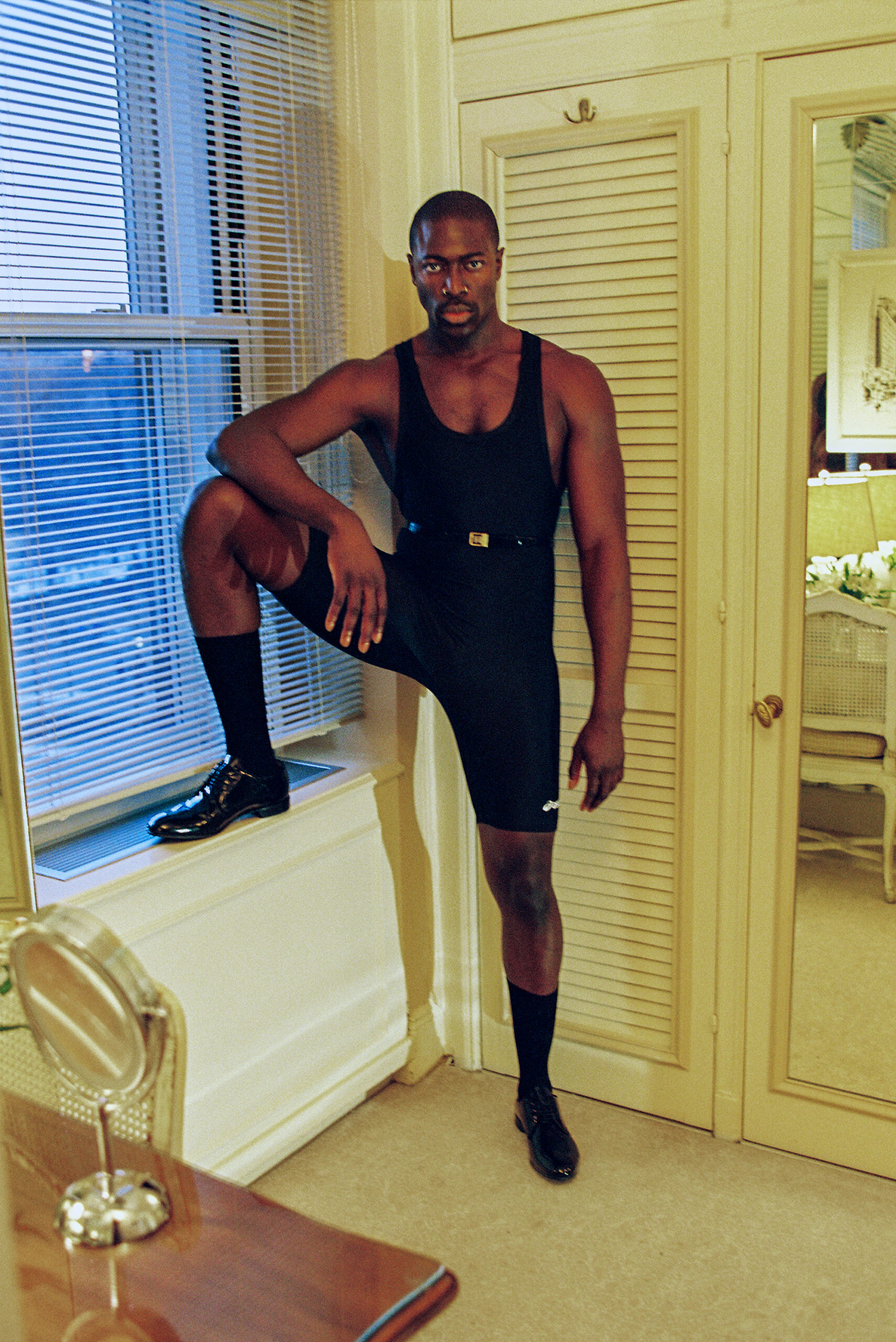
Singlet Stylist’s Own. Belt Saint Laurent by Anthony Vaccarello. Socks Calvin Klein. Shoes Bruno Magli.
EDEBIRI: Oh my god, I remember waking up as a child, and if one parent wasn’t in bed, being like, “So it’s me and dad in hell. Okay.”
SUMNEY: I always felt like the Rapture would happen while I was sleeping. At 10 or 11, I would have dreams in which I was dead and my spirit was just roaming the universe, like, “Where do I go?” I’d explain those dreams to my parents and they were like, “This is a dark child.” [Laughs]
EDEBIRI: We were similar children. I’d have dreams that I was convinced were prophetic. And so I would wake up sometimes and cry and be like, “Mom, call Auntie. See if everything’s okay. I had a dream.” [Laughs]
SUMNEY: I believe in that shit. Okay, wait. So your family was Christian growing up?
EDEBIRI: Yeah, my mom was born-again.
SUMNEY: And you had to go to church growing up?
EDEBIRI: Five days a week.
SUMNEY: Same.
EDEBIRI: But it was the first place that I found music, and I was doing plays with the church and I was a really good reader in school. I’m sure you could relate to this, where you’re like, “Everybody’s stressing about Shakespeare, like, be thou, thine. It’s not that serious.”
SUMNEY: Like, “Have you read the Bible?” [Laughs]
EDEBIRI: And a lot of the girls have not.
SUMNEY: Clearly, and it shows. That’s the other thing about being a musician, I can choose. I moved to North Carolina five years ago. I lived in L.A. for seven years and realized at some point that I can choose who to be around, who to give my energy to, and how much of the game I play. Acting, being in Hollywood, there’s a lot of demons, and you don’t fully get to choose how to engage with them. So how do you protect yourself?
EDEBIRI: It’s about energy management, because there’s a certain amount of your energy that will be sapped and there’s nothing you can do about it. I feel like I’m on a journey this year of learning how to say no. But you have space now.
SUMNEY: To speak literally, yes. I’m really blessed. I live in a fairly sizable house in the mountains of North Carolina. I travel a lot for work, but when I’m home, I’m home. There’s so much bullshit still, but I can just look outside the window or walk around my property and it’s good.
EDEBIRI: Do you prefer writing in nature versus the city?
SUMNEY: I can’t really write lyrics in the city. I’m learning how. When I lived in L.A., I would drive to Big Bear or Topanga whenever it was time to write lyrics. And then I would do composition and arrangement and production in L.A., or whatever city I was working in. Then sometimes I’d go to the mountains or fly to North Carolina and be like, “I’m going into my monastic state.” Like, I’m the first Black person to see a tree, basically.
EDEBIRI: [Laughs] But it feels like that, though. I saw you in 2016 or 2017 at a show in New York. I remember being so moved. I was like, “Oh, thank god there’s Black people out here making cool shit.” Especially because I was about to graduate and in that moment of, “Okay, I’m making things and I want to be a part of this community.” But I was like, “The work’s not clicking.” I just remember really loving that show and loving that space.
SUMNEY: Thank you. I appreciate that. This new music is a sonic extension of what I’ve done in the past and is going some places I haven’t explicitly gone before. So I’m a little nervous about the people who have been there from the beginning. I’m like, “What are they going to think?” I still rock with it, but I’m doing whatever I want at the same time.
EDEBIRI: That’s so important. Any time there’s a feeling of creating something so that people will listen to it, for me that’s a no-go zone.
SUMNEY: I agree. Also, it’s just dishonest, right? Not only do we grow and change, but we’re interested in so many different sounds and genres and mediums. I want to explore all of them.
EDEBIRI: When you start a song, does it start with words?
SUMNEY: I’ve been writing music since I was 12, and I was always very lyric focused, but I felt very insecure when I was starting as a working musician because I didn’t have any typical music knowledge. In college, I would always go to the jazz building at UCLA and grab people and make them play with me. I wanted real musicians to respect me, but I didn’t know shit about music.
EDEBIRI: Did you always have such a wide range or was that something you sort of discovered?
SUMNEY: When I was a kid, I was basically a eunuch. I had a really high voice and I could sing Mariah Carey whistle notes, I was very up there. And when I hit puberty, I got terrified. I was like, “Hold up. Y’all not taking this range.” So I would just sing falsetto all the time. I was also really shy.
EDEBIRI: The mental image of shy Mariah Carey is really amazing. [Laughs]
SUMNEY: On top of that, I grew up half of my life in Ghana. When I started writing songs I was there.
EDEBIRI: A lot’s going on.
SUMNEY: So much. I was practicing falsetto so much that it worked against the real deepening of my voice. I joined choir in senior year of high school and they’re like, “You’re a bass.” And I was like, “Oh.”
EDEBIRI: It’s like me and a capella where I was like, [sings] “I’m a soprano.” And they were like, “Girl, if you don’t get down there—”
SUMNEY: Not to embarrass you, but I feel like people don’t know.
EDEBIRI: No! Don’t do it!
SUMNEY: I’ve heard you sing on the internet and it was good.
EDEBIRI: Nobody warns you about being a millennial with internet access.
SUMNEY: We used to be safe.
EDEBIRI: We used to be a country. They went to the gutters of YouTube and found many things.
SUMNEY: But your singing is so good. Do you want to do music stuff at some point?
EDEBIRI: I don’t think I’m as good as—I think because I stopped singing, my voice has worsened. Don’t worry. I saw your face. I wasn’t going to completely lie.
SUMNEY: I was like, you’re not doing self-deprecation, because—
EDEBIRI: No, I’m pretty decent and I still kick ass at karaoke. I think also doing comedy, I had a few years where I was afraid of being earnest, and singing is something that is vulnerable for me. So I stopped and I regret it because my voice is not as good as it used to be.
SUMNEY: But it’s like riding a bike. You can get it back. My voice worsened during the pandemic. And then I was like, “Wait, that wasn’t supposed to happen.” I started taking lessons literally for the first time last year.
EDEBIRI: Whoa.
SUMNEY: But I’m curious to know if you have the desire to do music stuff.
EDEBIRI: I don’t not have the desire. If there’s something where it felt right, that’d be cool. I’ve always had a little slight dream of—do you know the Kate Bush song, “Why Should I Love You?”
SUMNEY: I don’t know that one.
EDEBIRI: Okay. It’s a song that Prince and her made together. I’ll send you the demo. It’s my favorite thing ever.
SUMNEY: Is this is our duet?
EDEBIRI: This is our duet. Do you have favorite vocalists?
SUMNEY: Ella Fitzgerald is definitely my number one and she was the first person that got me into, like, “Oh, singing is its own thing, apart from songwriting.” Nina Simone is another one that I think of every day. Jeff Buckley, Thom Yorke.
EDEBIRI: That’s my boy. I did pack a Radiohead shirt and I think I wore it yesterday, but I just had to check that it wasn’t on me.
SUMNEY: We love. And Thom loved Jeff Buckley. And Jeff Buckley loved Nina Simone. It’s all connected. I would say my two favorite current vocalists are Jazmine Sullivan and Fantasia Barrino.
EDEBIRI: God, I love Fantasia. I had a day where I was on shrooms in Miami. It was my birthday, that’s why I was on shrooms, and I was on the beach and I was just listening to “Wild Is the Wind.” And I was like, “It literally doesn’t get better than this.”
SUMNEY: If you listen to “Wild Is the Wind” on a day off on vacation, you’re a different kind of person because that’s not happy music. There is something dark-sided in your spirit.
EDEBIRI: For sure. And I’ve never denied that.
SUMNEY: That’s what I listen to when I’m like, “It’s time to just chill.”
EDEBIRI: What about OK Computer two times in a row? [Laughs] “Me time.”
SUMNEY: Nothing says “me time” like In Rainbows, just, like, crying.
EDEBIRI: [Laughs] Fully. Okay, I feel like there’s enough to transcribe. I’ll let you live your life.
SUMNEY: I think there is, yeah. Ayo, thank you so much for doing this.
EDEBIRI: Of course.
SUMNEY: I love you. We’re going to have a real moment, but we’re off to a great start.
EDEBIRI: A beautiful start. Love you, Moses. Bye.
———
Grooming: Kiyonori Sudo using Bumble and Bumble and Makeup Forever at L’atelier NYC.
Tailor: Maria Del Greco.
Photography Assistant: Henry Crawley.
Fashion Assistants: Alyssa Chandelle and Evie Lozano.
Production Assistant: Kiernan Francis.
Location: The Sherry-Netherland.

